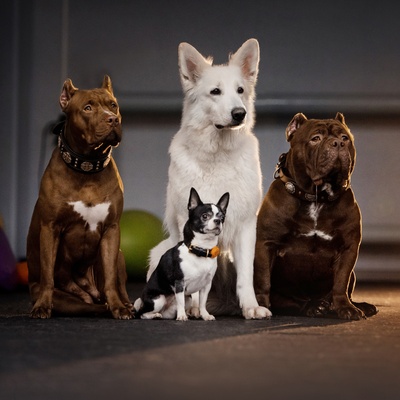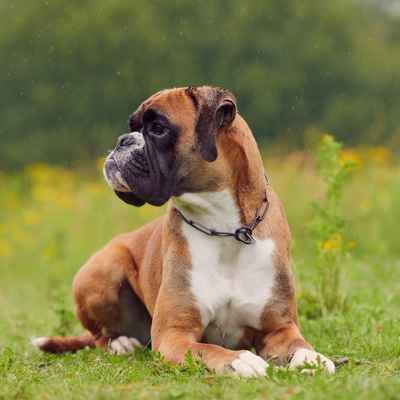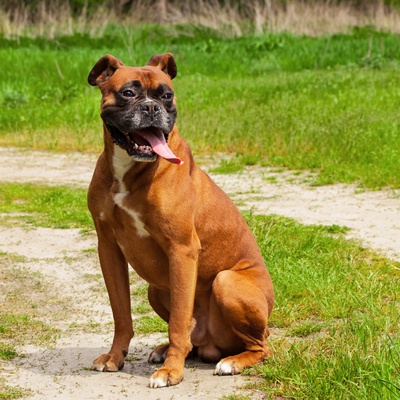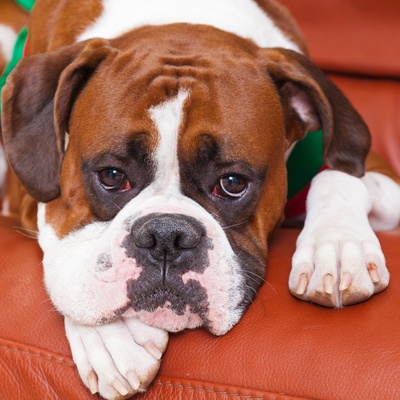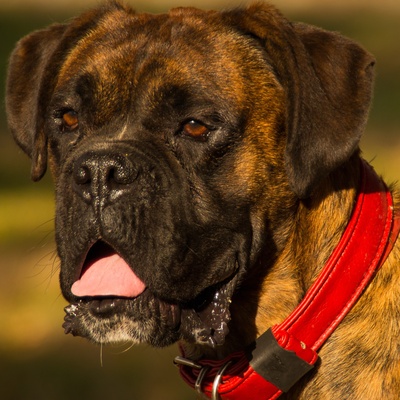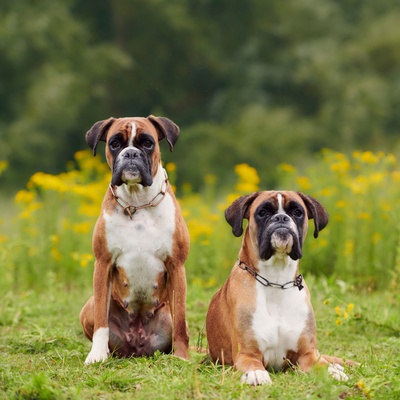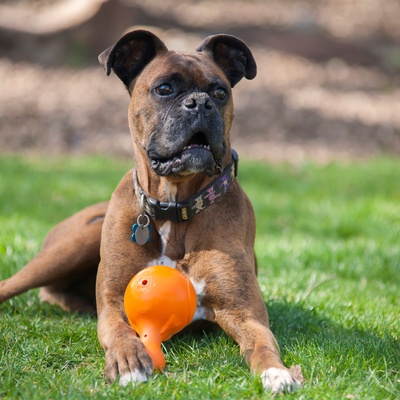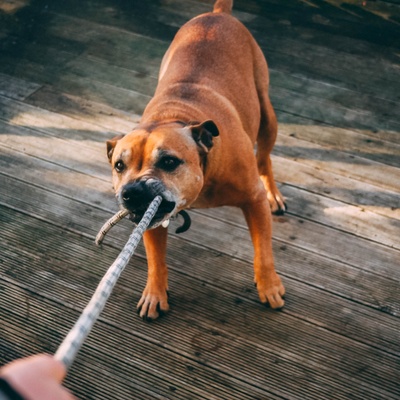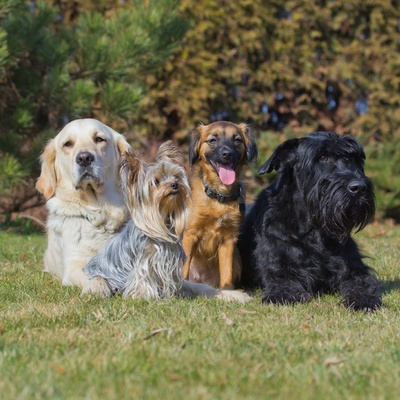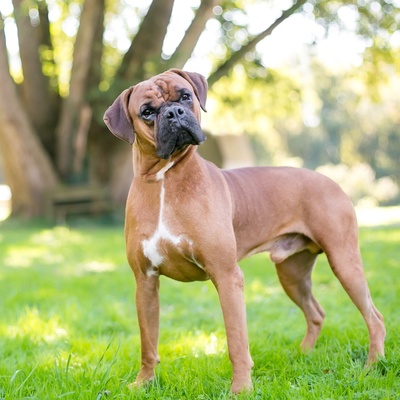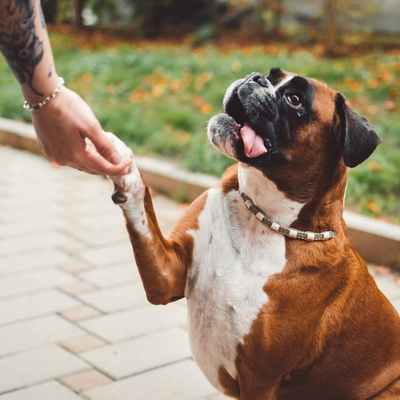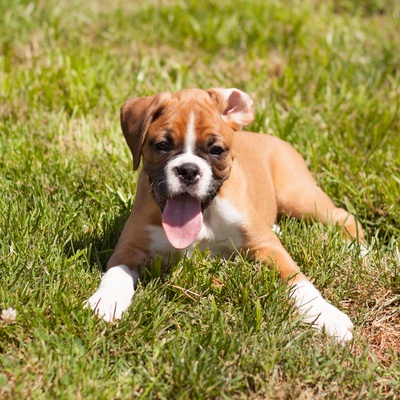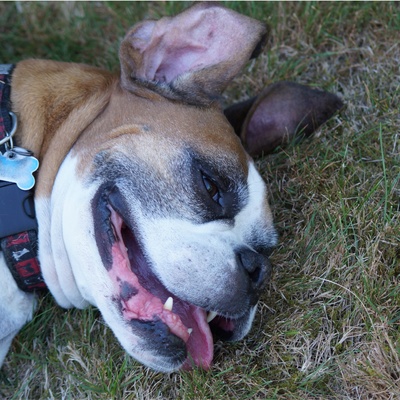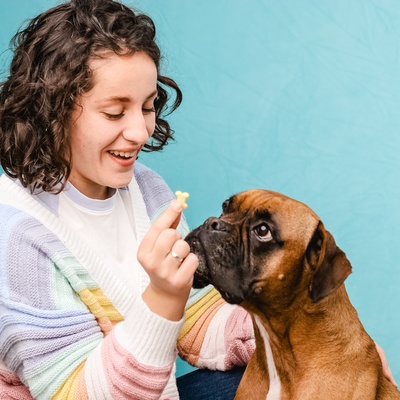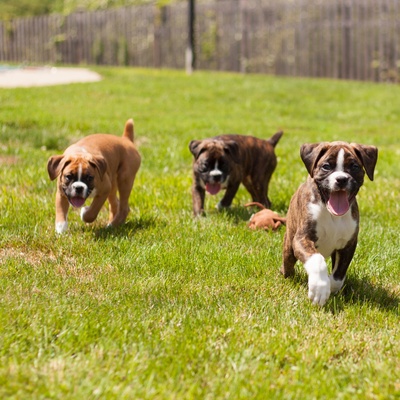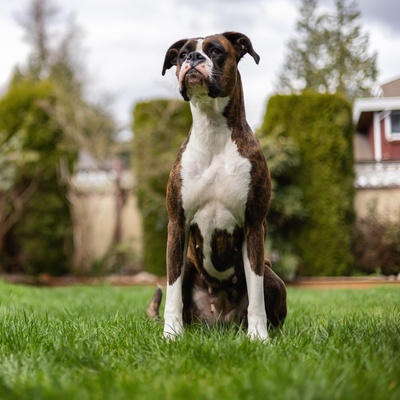Introducing the Boxer Dog
Discover all there is to know about the Boxer Dog : its characteristics, behavior, training, and its cost.
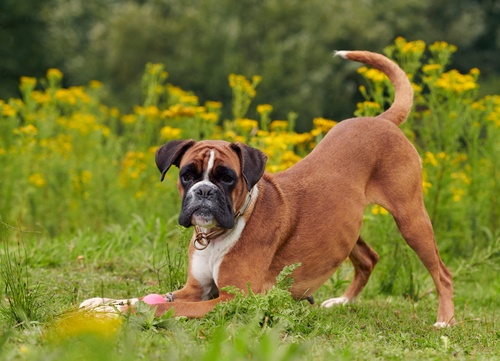
Discover all there is to know about the Boxer Dog : its characteristics, behavior, training, and its cost.
The origins of the Boxer Dog trace back to Germany in the late 19th century, emerging from the now extinct Bullenbeisser—a breed once used for hunting large game—and smaller local dogs. The Boxer is celebrated globally, not only for its athletic build and striking appearance but also for its dynamic blend of vigor and affection.
This breed possesses a natural aptitude for protection and companionship, making it a versatile and capable companion in any role. Known for their playful spirit and energetic demeanor, Boxers are particularly good with children, often protective and gentle with the younger members of the family. Their sociability extends to both humans and other dogs, characterized by a jovial and sometimes boisterous display of affection.
This section outlines the unique features of the Boxer Dog breed.
The Boxer belongs to the Working Group (2), which encompasses breeds known for their roles in guarding, pulling sleds, and performing water rescues, among other tasks.
The Boxer is a medium to large-sized breed. Typically, males stand around 23 to 25 inches at the shoulder, while females are slightly smaller at about 21.5 to 23.5 inches.
Boxers have a short, smooth coat that lies tight against the body. This type of coat is easy to maintain but provides little protection against extreme weather.
The coat of a Boxer can vary significantly, but they are most commonly found in shades of fawn and brindle. White Boxers are not rare but less common.
Boxers are adaptable to both apartments and houses as long as they receive sufficient exercise. They thrive in environments where they can be close to their families.
Boxers are known for their friendly and outgoing nature. They are typically excellent with children, making them ideal family pets.
While generally robust, Boxers are predisposed to certain health issues like heart conditions, hip dysplasia, and cancers. Regular vet check-ups and a healthy lifestyle are crucial for maintaining their health.
Boxers are intelligent and eager to please, which generally makes them quite responsive to training. However, they are also known for being somewhat headstrong, so consistency and positive reinforcement are key.
We can help!
Every dog has its own character, and so do you. Making the right choice will ensure his well-being and yours.
Take our quiz to find out which breed is right for you, based on your personality, lifestyle, location and many other criteria.
Don't wait any longer and take the quiz to find out the answer!
Boxer Dogs are medium to large-sized breeds known for their muscular build and athletic appearance. They possess a sleek, smooth coat, typically showcasing shades of fawn, brindle, and sometimes striking white.
The Boxer Dog stands tall with males typically measuring between 23 to 25 inches and females slightly shorter at 21.5 to 23.5 inches. Males usually weigh between 65 to 80 pounds, while females range from 50 to 65 pounds.
Boxers are known for their relatively rapid growth. Puppies can grow most of their height by six months old, but their weight and muscle mass continue to develop. By the age of 18 months, most Boxers will have reached their full size and weight, although some may continue to fill out until they are two years old.
Boxer Dogs boast a short, tight-fitting coat that gives them a sleek, streamlined appearance. The coat is smooth and glossy, which highlights their well-defined, muscular structure. This coat type is low maintenance compared to longer, thicker coats, yet it effectively protects the Boxer during moderate weather conditions.
The coat color of Boxer Dogs typically ranges within a specific palette. Common colors include various shades of fawn and brindle. The brindle pattern can range from sparse, subtle stripes to an appearance so dense it almost looks black. White Boxers, though less common, display large patches of white that may cover up to one-third of their body, and are particularly striking.
Despite its short length, the coat of a Boxer Dog does require regular attention due to its shedding. Boxers shed moderately throughout the year, with seasonal peaks typically occurring during the spring and fall when they shed more heavily. Regular brushing, about once or twice a week, helps to manage shedding and keeps the coat shiny and healthy.
While Boxers are not high-maintenance in terms of grooming, they do benefit from routine baths—every few months or so—to keep their coat clean and reduce any doggy odor. Given their short coat, Boxers are less likely to trap dirt and odors, but they are also less protected against extreme weather, necessitating indoor shelter during harsh conditions.
The Boxer Dog is a model of balance and well-proportioned design, making it a standout in the canine world for both its appearance and agility. The breed's head is distinctive, with a broad skull and a square, blunt muzzle that is one of its most recognizable features. The eyes of a Boxer are dark brown, round, and set to look forward with an alert and intelligent expression.
The ears, traditionally cropped in some regions, are set wide apart and high on the head, although natural ears that hang close to the cheeks are increasingly preferred in line with animal welfare standards. The body of the Boxer is compact and sturdy, displaying a well-muscled torso that exudes strength and stamina. This combination of features, including their smooth, powerful gait, highlights the Boxer's athleticism and physical capabilities.
Boxer Dogs are renowned for their loyalty, protectiveness, and deep affection. These traits make them wonderful family pets and reliable guardians.
The canine world is rich with diversity, encompassing approximately 400 recognized dog breeds, grouped into 10 distinct categories based on their traits and roles. The Boxer belongs to Group 2, which includes working breeds such as Mastiffs, Swiss Mountain Dogs, and other robust, intelligent types. This group is characterized by dogs that excel in various roles, from guarding and protection to pulling loads and performing rescue operations. Dogs in this category are admired for their strength, intelligence, and unwavering loyalty.
Boxers, in particular, stand out in this group for their developed protective instincts and exceptional intelligence. They are inherently gentle and affectionate with their families, making them excellent companions. Traditionally bred for hunting, they now serve predominantly as family protectors and companions, showcasing their adaptability and enduringly sociable nature.
Boxers are famously enthusiastic and energetic, known for their joyful and slightly boisterous demeanor. They exhibit a profound attachment to their owners, often showing a playful and protective nature towards them. This breed thrives on interaction and affection, making it crucial for them to have an owner who is not only present but also actively involved in their daily life.
While they are independent enough to entertain themselves at times, Boxers need consistent engagement and love to develop properly and maintain their happy disposition.
Boxer Dogs are incredibly sociable and generous by nature. They have a well-deserved reputation for getting along famously with humans, making them excellent family pets. Their friendly and outgoing nature extends to children, with whom they are typically patient and gentle, making them wonderful playmates and protectors.
However, like all dogs, it is important to encourage and develop their sociability from a young age through positive interactions with a variety of people and other animals. This early socialization ensures that they grow up to be well-adjusted adults, comfortable in various situations and environments.
Take the test and find out the dog breed that matches your personality and lifestyle.
Boxer Dogs are remarkably adaptable to various living conditions, whether it be a spacious suburban home or a more compact city apartment. What truly matters for a Boxer is the quality of care and interaction they receive from their owners. To maintain their health and happiness, Boxers require regular exercise, including at least two walks daily, each lasting around 30 to 45 minutes. These energetic dogs also benefit from playtime and mental stimulation to keep them engaged and content.
While Boxers can adapt to living indoors, they truly thrive when they have access to a secure outdoor space. Such an environment caters to their natural curiosity and need to expend energy. This breed has a high energy level and benefits greatly from having the opportunity to be active outdoors, where they can play fetch, tug-of-war, or simply romp around to their heart's content.
The Boxer Dog is renowned for its superior intelligence and eagerness to learn, making it a delight to train. This breed picks up new commands quickly due to its sharp mind and desire to please its owner. However, training a Boxer does come with specific nuances; they are energetic and can sometimes be stubborn, requiring a consistent and patient training approach. Positive reinforcement techniques such as praise, treats, and play are highly effective with this breed.
Additionally, to safeguard your Boxer and ensure peace of mind, equipping them with a GPS collar is advisable. This tool is especially useful for an active breed like the Boxer, who might get carried away with excitement and wander off during outdoor adventures.
Boxers possess remarkable listening qualities, which when combined with their loyalty and intelligence, make them excellent companions and family pets. They respond well to commands and are known for their ability to focus on their trainers during sessions, though their playful nature means that training should be engaging and varied to keep them interested.
Boxers are not only good at basic obedience but also excel in agility and advanced obedience training. Their sociability and confidence mean they are generally good with children and other animals, but early socialization is key to developing these traits.
The Boxer Dog is generally a robust breed with good overall health, but like any breed, they require attentive care to maintain their wellness and prevent common health issues.
While Boxers are typically healthy, they are known to be prone to certain genetic and acquired conditions. Common health issues include heart conditions such as aortic stenosis and arrhythmogenic right ventricular cardiomyopathy, which are serious and should be monitored by regular veterinary check-ups.
Boxers may also experience hip dysplasia and some cancers more frequently than other breeds. Additionally, due to their short noses, Boxers can suffer from breathing problems, especially in hot or very active situations. The typical lifespan for a Boxer is between 10 to 12 years.
Regular veterinary check-ups are essential for every Boxer, ensuring they stay up-to-date on vaccinations, deworming, and parasite treatments which are vital for warding off disease. At home, the care you provide daily plays a significant role in their overall health. Boxers, with their short fur, still require frequent brushing to manage shedding and keep their coat healthy. Ear care is also important; their folded ears can trap moisture and debris, leading to infections if not cleaned regularly. Dental care should not be overlooked, as routine teeth cleaning will prevent periodontal disease. Additionally, keeping their nails trimmed prevents walking discomfort and joint issues that can arise from overly long nails.
Since Boxers are not hypoallergenic and can produce significant allergens, managing your environment to reduce allergen buildup is also important for both the dog and family members with allergies.
Boxer Dogs, like all breeds, have specific nutritional needs that must be met to maintain their vitality and overall health. A balanced diet rich in proteins and essential vitamins is crucial for supporting their active lifestyle and muscular build. We recommend feeding your Boxer high-quality kibble that is formulated to meet the needs of medium to large, energetic breeds. This ensures they receive a well-rounded diet that supports their energy levels and physical health.
For Boxers that are especially active or those involved in agility or other sports, supplementing their diet with additional lean proteins can be beneficial. Options such as chicken, turkey, and lean cuts of red meat can provide extra protein, which is essential for muscle repair and growth. However, it is important to limit the fat content of their diet to prevent weight gain and related health issues. Always ensure that any additions to the diet are safe for dogs and avoid foods that are harmful to canines.
The Boxer Dog is highly regarded as a family pet and companion due to its energetic and friendly nature. It's important to consider several factors before adopting to ensure that this breed suits your lifestyle and environment.
Before adopting a Boxer Dog, it is essential to make an informed decision. Choosing a reputable breeder is critical, and visiting the breeder's premises allows potential owners to assess the living conditions and behavior of the puppies and their parents. It is important to inquire about the health of the puppy and its parents; reputable breeders will be transparent about any health issues the breed may be predisposed to and any conditions the puppies might have.
Lastly, mandatory electronic identification, like microchipping, is not always mandated at the federal level in the United States for cats and dogs. But microchipping is widely acknowledged as a successful way to permanently identify pets and increase the possibility of reuniting lost pets with their owners, even in the absence of universal regulations. As a pet owner, it is advised to inform yourself about municipal laws to ensure the safety and wellbeing of your pet.
The cost of acquiring a Boxer Dog puppy can vary significantly based on several factors such as lineage, pedigree, the breeder's reputation, or the age of the dog. Typically, prices for a Boxer puppy range from
to
.
Beyond the initial cost, prospective owners should also consider the ongoing expenses associated with owning a Boxer. These include veterinary fees, food, and other necessities, which can amount to approximately
to
annually, depending on the level of care provided.
Choosing a dog that matches your personality and lifestyle will ensure your well-being and his!
To access the most relevant information, suitable payment methods, and delivery in your region, please select the website corresponding to your country.

